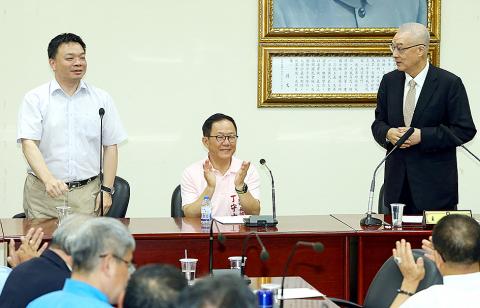Former Chinese Nationalist Party (KMT) legislator Kao Su-po (高思博) yesterday defeated his opponent in the KMT’s Tainan mayoral primary, setting the stage for a race for the mayoralty against Democratic Progressive Party Legislator Huang Wei-che (黃偉哲) in the Nov. 24 nine-in-one elections.
In accordance with past practice, KMT Organizational Development Committee director Lee Che-hua (李哲華) announced Kao as the winner of the primary at a news conference in Taipei without disclosing the actual results of opinion polls conducted on Kao and former National University of Tainan president Huang Hsiu-shuang (黃秀霜).
“The poll results showed that Kao outperformed Huang, who expressed her gratitude that the primary was calm and filled with sincerity, and pledged to help campaign for Kao,” KMT Tainan Chapter director Hsieh Lung-chieh (謝龍介) said.

Photo: CNA
The residents of Tainan have longed for changes following 25 years of DPP governance, which has deteriorated the quality of living in the city, Hsieh said.
Kao, 49, is the son of former Taiwan Provincial Assembly speaker Kao Yu-jen (高育仁), who was Tainan County commissioner from 1973 to 1976 and is the father-in-law of New Taipei City Mayor Eric Chu (朱立倫).
“The people of Tainan have grown so accustomed to a DPP mayor that they cannot even imagine what the city could become under a leader from a different party,” Kao Su-po said, adding that he, representing the new force of the KMT, was determined to bring Tainan more in line with its status as a special municipality.
The KMT is expected to formally nominate Kao Su-po and KMT Kaohsiung Chapter director Han Kuo-yu (韓國瑜) as its candidates for the Tainan and Kaohsiung mayoral elections respectively at a meeting of the KMT Central Standing Committee today.

The Ministry of Economic Affairs has fined Taobao NT$1.2 million (US$36,912) for advertisements that exceed its approved business scope, requiring the Chinese e-commerce platform to make corrections in the first half of this year or its license may be revoked. Lawmakers have called for stricter enforcement of Chinese e-commerce platforms and measures to prevent China from laundering its goods through Taiwan in response to US President Donald Trump’s heavy tariffs on China. The Legislative Yuan’s Finance Committee met today to discuss policies to prevent China from dumping goods in Taiwan, inviting government agencies to report. Democratic Progressive Party Legislator Kuo Kuo-wen (郭國文) said

The Ministry of Economic Affairs has fined Taobao NT$1.2 million (US$36,900) for advertisements that exceeded its approved business scope and ordered the Chinese e-commerce platform to make corrections in the first half of this year or its license would be revoked. Lawmakers have called for stricter supervision of Chinese e-commerce platforms and more stringent measures to prevent China from laundering its goods through Taiwan as US President Donald Trump’s administration cracks down on origin laundering. The legislature’s Finance Committee yesterday met to discuss policies to prevent China from dumping goods in Taiwan, inviting government agencies to report on the matter. Democratic Progressive Party

Taiwan and its Pacific ally Tuvalu on Tuesday signed two accords aimed at facilitating bilateral cooperation on labor affairs, according to Taiwan’s Ministry of Foreign Affairs (MOFA). The governments inked two agreements in Taipei, witnessed by Foreign Minister Lin Chia-lung (林佳龍) and visiting Deputy Tuvaluan Prime Minister Panapasi Nelesone, MOFA said in a news release. According to MOFA, the agreements will facilitate cooperation on labor issues and allow the two sides to mutually recognize seafarers’ certificates and related training. Taiwan would also continue to collaborate with Tuvalu across various fields to promote economic prosperity as well as the well-being of their

Sung Chien-liang (宋建樑), who led efforts to recall Democratic Progressive Party (DPP) Legislator Lee Kun-cheng (李坤城), was released on bail of NT$80,000 today amid outcry over his decision to wear a Nazi armband to questioning the night before. Sung arrived at the New Taipei District Prosecutors’ Office for questioning in a recall petition forgery case last night wearing a red armband bearing a swastika, carrying a copy of Adolf Hitler’s Mein Kampf and giving a Nazi salute. Sung left the building at 1:15am without the armband and covering the book with his coat. Lee said today that this is a serious